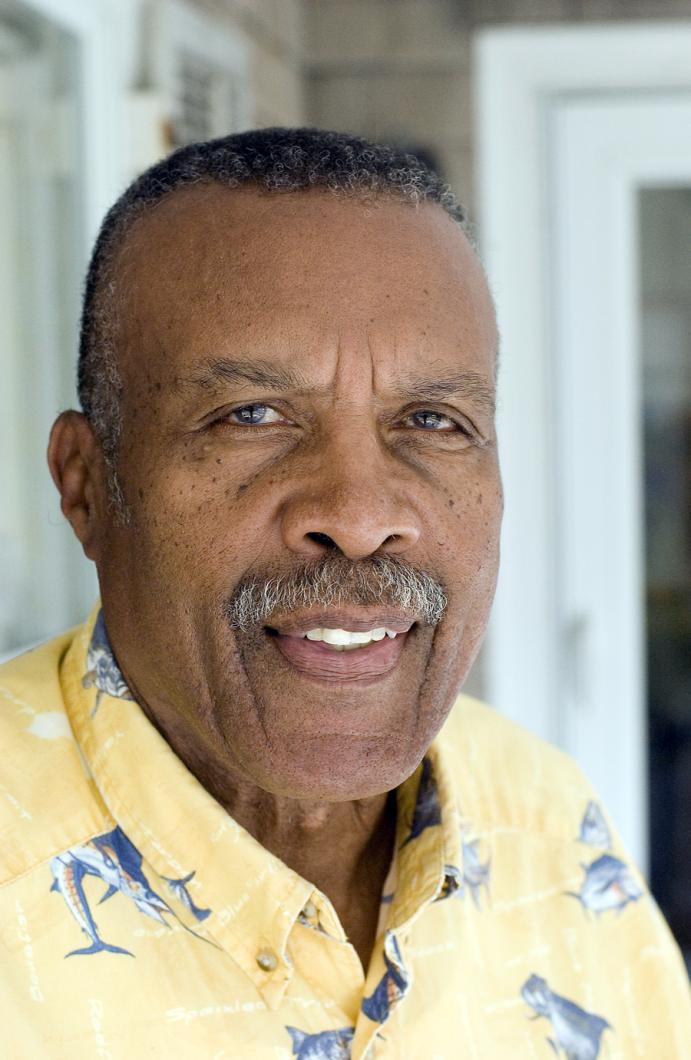Patriotism and the American dream are themes in William Baker’s very personal album of original music, released at a party last weekend at the Baker home in Oak Bluffs.
Mr. Baker, a retired Lieutenant Colonel in the U.S. Army, and his wife Bettye, hosted a crowd of roughly 160 to celebrate the release of Come Home America, We Love You.
Is the CD a love letter to America or a redress of grievances? In fact, much of the experience of writing Come Home America, We Love You is shrouded in mystery, even for the artist himself. “Several years ago, in 2004 or 2005, I started to hear a tune in my head — a melody late at night . . . and I wasn’t asleep,” he said in a recent interview. “It was haunting and disturbing to me, like something was calling . . . not necessarily to me.”
“It recurred and then disappeared,” he continued. But the song was never gone for long. Finally, one evening, Mr. Baker got up out of bed and went to his computer. He opened a new document and wrote until he felt at peace. When he finished, he had written a poem three typed pages long. But he still hadn’t found the answer to the real mystery: what was the song and why couldn’t he get it out of his head?
“I don’t know where I got the title . . . but after I wrote the poem I didn’t hear it [the song] anymore,” he said.
Mr. Baker decided to consult with an expert to solve his musical mystery. He contacted friend and Island musician Jimmy Parr, an engineer and musician who has experience working with the Island’s (and the world’s) most talented singers and songwriters. Mr. Parr asked Mr. Baker whether he could hum the melody, and Mr. Baker could not. But by this time he was on a mission. “I went and bought a baby grand piano and tried to pick out the melody,” he said.
He had all but given up when he heard the song being played. “Last August, I was sitting in Union Chapel, and I heard the organist playing the prelude to morning service. I said, ‘Oh my God! this is it!’ ”
But he couldn’t get to the organist that morning. “Charles Ogletree was speaking and the place was mobbed,” he recalled.
Mr. Baker was able to meet with the organist the next week before services, and asked if he would be willing to look at his poem to see if it would fit the music as lyrics. And with a bit of tweaking, they did. “Truthfully,” he said, “I felt like I wasn’t cracking up, that I had found it.”
After researching the song, Mr. Baker learned that it was originally sung in 1585 and was titled Jerusalem, My Happy Home. The second rendition was an American version called Land of Rest, dated near 1832. Although many of Mr. Baker’s friends theorized that perhaps he had led different lives during these eras, or that the song was a message from God, he is too practical for such beliefs. He said it is likely that he heard the song at the Howard chapel during his undergraduate years.
With the mystery put to rest, Mr. Baker decided that he wanted to record the melody. He commissioned Kathy Coch to write and tweak the music, and then he and Mr. Parr went to Mr. Parr’s studio in Vineyard Haven to record. Mr. Baker had a firm idea of what he wanted: “A little country western like Ray Charles . . . a little blues, Negro spirituals, a little Eric Clapton, I want it to be a folk ballad.” He said Mr. Parr worked for roughly seven days, checking with the Bakers throughout. When Mr. Parr reached his last cut, he and the Bakers shared a special moment, relishing the success of the track: “Jimmy says he saw a tear roll down my face,” Mr. Baker said.
The album features lady liberty on its cover. “Strong country, strong family values and structure,” Mr. Baker said. “There’s a presumption that the union is perfect and all we have to do is make it more perfect,” he added, referring to the often quoted preamble to the Constitution. He offers his own idea: “It was never perfect . . . it’s about continuing the process to make this country better.”
The CD, which is available for purchase on iTunes, CDBaby, and several other digital stores, is a provocative meditation on these beliefs.




Comments
Comment policy »